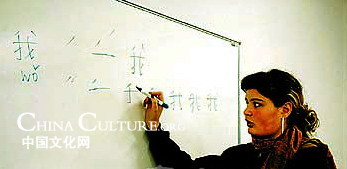Maja Tvrdy knew her Olympic journey wouldn't end up with a medal, but she looked forward to bringing home something really unique.

The 24-year-old Slovenian badminton player, after crashing out of the second-round singles of a sport with overwhelming Asian dominance on Aug. 10, found what she was looking for in a corner of the Athletes' Village, named the "Chinese Learning Area."
The Chinese tutors in the area helped Tvrdy find the Chinese equivalents to the Slovenian names of a dozen friends of hers back at home, before she wrote them down on paper of different colors with a brush pen -- by copying every movement of a tutor and struggling with the details of every stroke.
"I think my friend will like these small presents, which are from a different culture," said the blonde, who spent nearly two hours making them.
Since its opening on July 27, the "Chinese Learning Area" has received more than 1,000 visitors from 60 to 70 countries and regions, said Yao Yuan, deputy chief of the area.
The visitors are most interested in three things: to learn some basic Chinese such as "Ni Hao (hello)" "Xie Xie (thanks)" and "Zai Jian (goodbye)," get a Chinese name for themselves or their families and friends, and try some traditional Chinese calligraphy.
Twenty-six members in Yao's team work on shifts from 11 a.m. to 9 p.m. every day, but the number of visitors is growing as many competitions at the Games have concluded or entered the finals, giving the athletes more leisure time.
"We are always busy, and now we have to open at least half an hour earlier," said Yao. "But everyone is happy for that, because we also hope to see Chinese become a popular language internationally."
With a floor space of about 30 square meters, the "Chinese Learning Area" is brightly decorated with Chinese painting scrolls, Peking Opera facial masks and China knots, a traditional handicraft symbolizing good fortune. But most conspicuous is a large bookshelf loaded with Chinese-learning materials, and a wall to which more than a dozen brush-pen writings by the foreign learners, carrying either their Chinese names or their blessings to the host city and nation, are glued.
"Really not bad, right? Just think this was the first try for most of them," said Yao, who worked for the Great Wall Chinese Center under the Office of Chinese Language Council International before joining the Olympic service.
"The Beijing Olympics are an opportunity for the Chinese language to gain more popularity and for China to be better understood by foreigners," she said. "And we have a win-win situation here: you know, our service is completely free, while learning Chinese outside China could be quite difficult and costly."
In another example of such free service, the Office of Chinese Language Council International paid China Mobile to send a text short message to all mobile phone users in the Olympic Green, the central area of the Games, two days after the Games' opening.
"Learning Chinese, Enjoy Olympics," read the message, which taught the recipients four short phrases in Chinese, English and the Chinese pronunciation system of Pinyin.